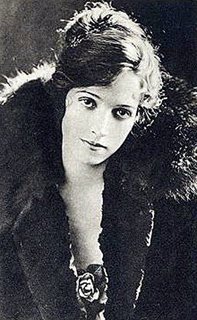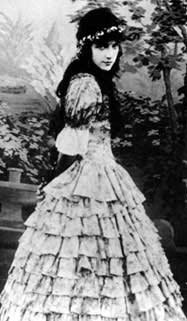Happy Birthday Miriam Cooper
Continuing in our series of tributes to Griffith actresses, today is the birthday of Miriam Cooper. Miriam appeared in Griffith's two major epics Birth of a Nation and Intolerance. Like many of the other Griffith actresses, Miriam was brought up in a poor household without a father. Her mother and grandmother raised her in New York City and it was there that she got her start in movies.
 In 1911 when she went to the Biograph studios and found work as an extra in a Griffith short. She initially had to hide that fact that she was being paid acting since movie people and actresses were not highly regarded in those days. Her small screen appearance went unnoticed by Griffith so she started working with Kalem Studios. There she appeared in shorts and did all of her own stunts. Her roles were larger, but she received second-billing under Anna Nilsson. When Miriam decided to ask for a raise, she was fired. In 1914, she was back in New York City, and her old screen test was rediscovered by Griffith. After leaving Griffith in 1916, she worked primarily for her husband, the famous director Raoul Walsh. She was a reluctant movie actress and was itching to be out of the business, but her husband prodded her into appearing in his films since he liked directing her. By 1924 she had made her last film and retired from movies. After movies her personal life took some bad turns as she divorced her husband after finding out he was having an affair. Unable to have children, she adopted two boys. As they got older, they both sided with their adopted father and after they reached adulthood, she never spoke to them again. But she did invest her money wisely and was able to live off of her movie earnings.
In 1911 when she went to the Biograph studios and found work as an extra in a Griffith short. She initially had to hide that fact that she was being paid acting since movie people and actresses were not highly regarded in those days. Her small screen appearance went unnoticed by Griffith so she started working with Kalem Studios. There she appeared in shorts and did all of her own stunts. Her roles were larger, but she received second-billing under Anna Nilsson. When Miriam decided to ask for a raise, she was fired. In 1914, she was back in New York City, and her old screen test was rediscovered by Griffith. After leaving Griffith in 1916, she worked primarily for her husband, the famous director Raoul Walsh. She was a reluctant movie actress and was itching to be out of the business, but her husband prodded her into appearing in his films since he liked directing her. By 1924 she had made her last film and retired from movies. After movies her personal life took some bad turns as she divorced her husband after finding out he was having an affair. Unable to have children, she adopted two boys. As they got older, they both sided with their adopted father and after they reached adulthood, she never spoke to them again. But she did invest her money wisely and was able to live off of her movie earnings.

I've only seen Miriam in Birth of a Nation and Intolerance. Her performance in Birth is a bit too detached. I don't think she brings any emotions to the role and with her sharing screen time with great actors such as Lillian Gish, Mae Marsh, and Henry Walthall, she doesn't seem in the same league. Her performance in Intolerance as the friendless one is a lot better. There she plays a jealous woman who kills her lover and then frames an innocent man. In this role she captures the emotions of a person dealing with guilt and debating whether to let an innocent man die for her crime. At the beginning of the 70s there was an interest in silent film as movies became part of academia. Luckily before she passed away, she was able to finish her autobiography, Dark Lady of the Silents. I guess after the 70s interest faded and her book is now out of print. You can find copies on ebay, and it's a good read to see what the film industry was like during its infancy.
 In 1911 when she went to the Biograph studios and found work as an extra in a Griffith short. She initially had to hide that fact that she was being paid acting since movie people and actresses were not highly regarded in those days. Her small screen appearance went unnoticed by Griffith so she started working with Kalem Studios. There she appeared in shorts and did all of her own stunts. Her roles were larger, but she received second-billing under Anna Nilsson. When Miriam decided to ask for a raise, she was fired. In 1914, she was back in New York City, and her old screen test was rediscovered by Griffith. After leaving Griffith in 1916, she worked primarily for her husband, the famous director Raoul Walsh. She was a reluctant movie actress and was itching to be out of the business, but her husband prodded her into appearing in his films since he liked directing her. By 1924 she had made her last film and retired from movies. After movies her personal life took some bad turns as she divorced her husband after finding out he was having an affair. Unable to have children, she adopted two boys. As they got older, they both sided with their adopted father and after they reached adulthood, she never spoke to them again. But she did invest her money wisely and was able to live off of her movie earnings.
In 1911 when she went to the Biograph studios and found work as an extra in a Griffith short. She initially had to hide that fact that she was being paid acting since movie people and actresses were not highly regarded in those days. Her small screen appearance went unnoticed by Griffith so she started working with Kalem Studios. There she appeared in shorts and did all of her own stunts. Her roles were larger, but she received second-billing under Anna Nilsson. When Miriam decided to ask for a raise, she was fired. In 1914, she was back in New York City, and her old screen test was rediscovered by Griffith. After leaving Griffith in 1916, she worked primarily for her husband, the famous director Raoul Walsh. She was a reluctant movie actress and was itching to be out of the business, but her husband prodded her into appearing in his films since he liked directing her. By 1924 she had made her last film and retired from movies. After movies her personal life took some bad turns as she divorced her husband after finding out he was having an affair. Unable to have children, she adopted two boys. As they got older, they both sided with their adopted father and after they reached adulthood, she never spoke to them again. But she did invest her money wisely and was able to live off of her movie earnings. 
I've only seen Miriam in Birth of a Nation and Intolerance. Her performance in Birth is a bit too detached. I don't think she brings any emotions to the role and with her sharing screen time with great actors such as Lillian Gish, Mae Marsh, and Henry Walthall, she doesn't seem in the same league. Her performance in Intolerance as the friendless one is a lot better. There she plays a jealous woman who kills her lover and then frames an innocent man. In this role she captures the emotions of a person dealing with guilt and debating whether to let an innocent man die for her crime. At the beginning of the 70s there was an interest in silent film as movies became part of academia. Luckily before she passed away, she was able to finish her autobiography, Dark Lady of the Silents. I guess after the 70s interest faded and her book is now out of print. You can find copies on ebay, and it's a good read to see what the film industry was like during its infancy.


<< Home